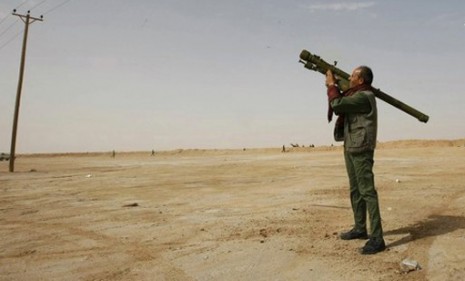Should the U.S. arm Libyan rebels?
Moammar Gadhafi's opponents are reportedly in disarray, and fleeing. Hillary Clinton says the U.S. may arm them. Should we?

A free daily email with the biggest news stories of the day – and the best features from TheWeek.com
You are now subscribed
Your newsletter sign-up was successful
The Obama administration is in a heated debate, both internally and with our NATO allies, over arming the Libyan forces trying to oust Moammar Gadhafi. Secretary of State Hillary Clinton said Tuesday that the U.S. is allowed to skirt the U.S. arms embargo, while NATO's leader disagreed. Meanwhile, after days of gaining ground, aided by allied airstrikes, the Libyan rebels are in retreat again, and opposition leaders are blaming Gadhafi's far-superior firepower. With the future of Libya, and the NATO mission, at stake, should we find a way to give the rebels better weapons?
No, we can't risk arming jihadists: With the rebels apparently in a "disorganized, panicked retreat" once again, it's tempting to want to do something, says Doug Mataconis at Outside the Beltway. But giving them weapons "poses at least two problems": Key coalition allies would defect, and we'd be arming a rebel force that contains "flickers" of potential al Qaeda and Hezbollah fighters, according to NATO. It "seems rather inadvisable" to arm our enemies.
"Libyan rebels running out of steam again?"
The Week
Escape your echo chamber. Get the facts behind the news, plus analysis from multiple perspectives.

Sign up for The Week's Free Newsletters
From our morning news briefing to a weekly Good News Newsletter, get the best of The Week delivered directly to your inbox.
From our morning news briefing to a weekly Good News Newsletter, get the best of The Week delivered directly to your inbox.
Yes, we should go all in: It almost doesn't matter who the rebels are, says Roger Cohen in The New York Times. Libya will be free, and now that we are involved, we need to "be ruthless" about helping usher Gadhafi out. "Arm the resurgent rebels. Incapacitate Gadhafi. Do everything short of putting troops on the ground." The result will be a "country that is imperfect but open," and that's good for America and the world.
Our history of arming rebels is pretty grim: We've been down this "old, dark path" before, and it rarely ends well, says Max Fisher in The Atlantic. From Afghanistan to Nicaragua, U.S.-armed insurgencies usually "create instability and violence" that add to a country's problems. Britain and France may send weapons to Libya even without the U.S., but America, at least, shouldn't add another chapter to our "sordid history" of arming insurgents.
"In arming Libyan rebels, the U.S. would follow an old, dark path"
A free daily email with the biggest news stories of the day – and the best features from TheWeek.com
-
 ‘Those rights don’t exist to protect criminals’
‘Those rights don’t exist to protect criminals’Instant Opinion Opinion, comment and editorials of the day
-
 Key Bangladesh election returns old guard to power
Key Bangladesh election returns old guard to powerSpeed Read The Bangladesh Nationalist Party claimed a decisive victory
-
 Judge blocks Hegseth from punishing Kelly over video
Judge blocks Hegseth from punishing Kelly over videoSpeed Read Defense Secretary Pete Hegseth pushed for the senator to be demoted over a video in which he reminds military officials they should refuse illegal orders